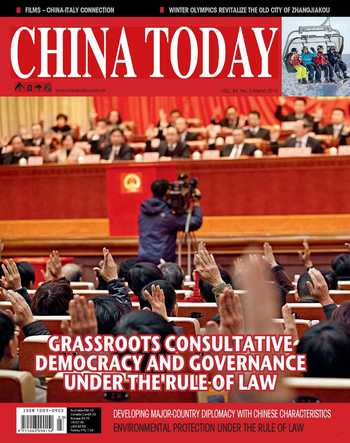China’s Modernized Thinking on Governance
Ancient Chinese philosopher and politician Guan Zhong of the Spring and Autumn Period (770-476 BC) proposed the idea of, “running a country according to law.” The concept of law as a tool of governance was subsequently passed down over centuries. Emperors throughout millennia of autocratic monarchy, however, regarded themselves as above the law; it was to them indeed nothing more than a tool. Today, China advocates the “rule of law” as an ultimately authoritative force whose power consolidates the governance system under the confines of the law.
Since the establishment of the Peoples Republic of China in 1949, exploration and practice of the rule of law have been incessant, gradually forming Chinas particular legal system. Today, China has begun strengthening law enforcement and justice. An enhanced judiciary, promotion and popularization of the law, and the resultant improved governance will instill in the public consciousness faith in the concept. The country is thus advancing towards the rule of law.
The rule of law has, in a sense, wrought a comprehensive and profound revolution on China. The country is undergoing economic restructuring and transformation of its growth model, and it is the economic base that determines the superstructure, wherein the rule of law is a main ideology. The Fourth Plenary Session of the 18th Central Committee of the Communist Party of China hence proposed strengthening without delay the leading role and regulatory function of the rule of law. On one hand, it is expected to lead and standardize the process and safeguard the results of reform and opening-up; on the other, the rule of law will be perfected amid the process of reform and opening-up, not least through absorbing the successful experience of other countries. Chinas reforms are becoming deeper and harder; they need the institutional guarantees that the rule of law provides to jointly propel modernization of Chinas national governance.
Rule of law now applies to every facet of governance, in- cluding domestic and foreign affairs and national defense. Regulating social behavior, restricting the exercise of power, and guaranteeing rights will ensure social justice and maintain social order. It will moreover promote the development of Chinas politics, economy, society, culture, and ecological health.
Good governance is taking shape in Chinas political arena, as manifest in its community-level consultative democracy. In the grassroots democracy, which started in the 1980s, participants freely discuss issues of common concern face to face; their opinions are gathered and become important bases for local government policy making. Communitylevel consultative democracy is of far-reaching significance in advancing construction of a law-based government and democratic politics. This year, still more efforts will be made to combat job-related crimes, and to improve the mechanism for appealing against unjust, false and erroneous convictions. A pilot cross-regional system of investigating criminal complaints is also planned, along with investigations into trouble-shooting solutions to everyday disputes, socialization of drug rehabilitation, and facilitation of community correction programs. As environmental protection is now a top national priority, China has embarked on a green GDP pathway. Meanwhile, environmental legislation and enforcement are strictly enforced in the interests of sustainable development.
Chinas governance modernization drive does not simply equate with legalization, because legislation is not an omnipotent tool. Rule of law is in essence an awCCareness of rule. Governing the country under the concept of rule of law essentially entails obeying and playing by the rules. The rule of law, along with the thinking on politics, ethics, economics, and reform, constitutes Chinas modern governance ideology.

